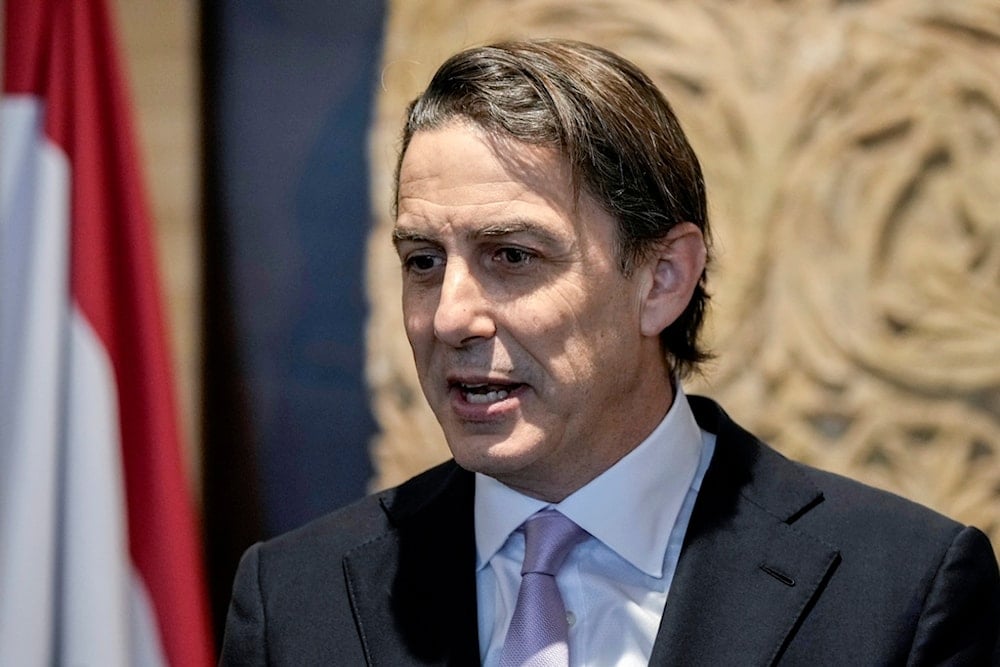No ceasefire deal could have included 'buffer zone' in Lebanon: Envoy
US Envoy Amos Hochstein underlines that no deal with Lebanon could have seen the Israeli occupation getting its hands on a buffer zone in the country's south.
-

Amos Hochstein, senior advisor to President Joe Biden, gives a statement to the media after his meeting with Parliament Speaker Nabih Berri, in Beirut, Lebanon, Wednesday, November 20, 2024 (AP)
US Special Envoy Amos Hochstein defended the recently brokered ceasefire between the Israeli occupation and Hezbollah, dismissing claims that the former could have secured a more favorable deal, including maintaining a buffer zone inside Lebanon.
Hochstein rejected the criticism voiced by former Israeli Prime Minister Naftali Bennett, who argued that the lack of a buffer zone in the agreement would allow Hezbollah to rebuild positions near the border, potentially staging future attacks.
“Yes, there are fantasy deals where you get a ceasefire agreement with a security zone, but those won’t ever happen,” Hochstein told Israeli Channel 12.
The envoy emphasized that maintaining a buffer zone would require the Israeli regime to occupy Lebanese territory, a move unacceptable to Lebanon or the international community as it is in clear violation of its sovereignty. Instead, the deal relies on commitments by Hezbollah to cease rocket fire and calls for the prevention of rebuilding the movement's infrastructure.
West, allies to boost Lebanese Army
Hochstein, for the sake of giving more assurances to the Israeli occupation, pointed out that Western and Arab allies have pledged to bolster the Lebanese Army with financial support, equipment, and training in order to allow it to maintain its presence in the south.
The agreement also expands an existing enforcement mechanism under UN Security Council Resolution 1701, with the US and France now leading a tripartite committee alongside the Israeli occupation, Lebanon, and UNIFIL. This committee is tasked with addressing violations in real time.
Hochstein highlighted key elements of the deal, including the deployment of the Lebanese Army across southern Lebanon to replace Israeli troops over two months, aiming to keep Hezbollah from maintaining an armed presence south of the Litani River.
Hassan Fadlallah, an MP from Hezbollah's Loyalty to the Resistance Bloc in the Lebanese Parliament, said Wednesday that the party was working with the army's deployment across south Lebanon under the parameters of a ceasefire with "Israel," maintaining that "there will be no problem."
Prime Minister Najib Mikati stated that the army will strengthen its presence in the South, while the Lebanese Army revealed it has begun "reinforcing its presence in the South Litani sector and extending the state's authority in coordination with the United Nations Interim Force in Lebanon (UNIFIL)."
No pressures on 'Israel'
Moreover, Hochstein also downplayed claims of US pressure on the Israeli occupation, including alleged threats to withhold weapons or veto a UN resolution. "There were no threats whatsoever… Those ideas never came up in discussions at any point," Hochstein asserted.
Israeli Prime Minister Benjamin Netanyahu’s office, meanwhile, criticized Hochstein for describing the ceasefire as "permanent", clarifying that fighting could resume if violations occur.
The United States has dismissed Israeli Prime Minister Benjamin Netanyahu's claims that American threats forced the Israeli occupation to accept a ceasefire agreement with Hezbollah, Haaretz reported on Wednesday. Contradictory narratives have emerged from Netanyahu's office and Washington regarding the extent of US involvement in brokering the deal.
Israeli officials alleged that the Biden administration issued two significant threats: halting US arms shipments to the Israeli occupation and withholding its veto in the UN Security Council. These claims were categorically denied by American officials, who described their role as mediation rather than coercion.
An anonymous senior US official stated, "At no point was there any threat to withhold a Security Council veto or to suspend arms shipments. This agreement was reached through dialogue, not ultimatums."
Throwing blame on the US
Netanyahu's aides reportedly briefed journalists to build public support for the ceasefire by portraying it as an unavoidable decision imposed by the US. Analysts suggest this narrative is intended to counter criticism from the Israeli occupation's right-wing factions, which oppose any concessions to Hezbollah and Lebanon.
US officials countered this claim, emphasizing that Netanyahu was a willing partner in the negotiations. "The idea of US threats is a fabrication to appease domestic critics," said a senior Biden administration official.

 5 Min Read
5 Min Read








